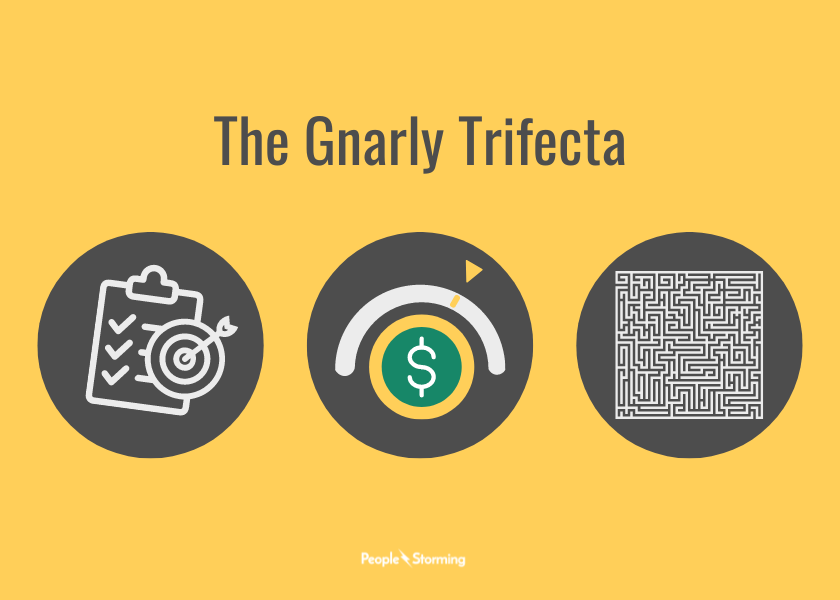Three psychological effects that screw with your team's productivity
They're powerful but they can be overcome
When you think about the factors that compromise you and your team’s ability to get sh*t done, what springs to mind?
Amongst the many answers to that question, there are three highly relevant psychological effects to consider…
The planning fallacy
The sunk cost fallacy
Complexity bias
The Planning Fallacy
When it comes to our todo list we often overestimate the impact of a piece of work (particularly in high-pressure situations). At the same time, we often underestimate the cost of that work because it can be difficult to see all the moving pieces clearly. Even when we’ve done something a few times before (and so have a handle on the complexity), we’ll still tend to underestimate it. We justify our estimates on the basis that our experience should make the job easier this time. This triumph of optimism over past data when estimating work is called ‘the planning fallacy’.
A good tactic to avoid the planning fallacy is to consider each project or task with the lenses of best- and worst-case scenario … and then plan for the worst case. It’s much better to under-promise and over-deliver than the reverse.
Sunk Cost Fallacy
The sunk cost fallacy is the thing that makes us believe we should keep investing time, money or energy into something because we’ve already invested so much that the universe must owe us a payoff at any moment.
The sunk cost fallacy occurs because we are not purely rational decision-makers and are often influenced by our emotions. When we have previously invested in a choice, we are likely to feel guilty or regretful if we don’t follow through on that decision.
The sunk cost fallacy is also associated with commitment bias, which is where we continue to support our past decisions despite new evidence suggesting that it isn’t the best course of action.
As coaches, we see this particular fallacy creep into people’s prioritization all over the place. It’s actually really hard for human beings to just cut their losses when they should and so we always recommend that you ask yourself this coaching question when assessing the things on your todo list…
“Is my sense of both the remaining cost and the likely payoff of this work up-to-date?”
If you’re up for it, take a few minutes now and look at your backlog of personal tasks through the lens of this question. Notice, in particular, any tasks where the ratio described by the question has changed dramatically.
Complexity Bias
There is one other psychological effect that we often see creating more ‘work-in-progress’ (WIP) than is ideal. This is ‘complexity bias’. This bias makes us feel that complicated solutions and explanations are more fitting in situations where the stakes are high.
We resist jumping in with simple solutions because we assume that important problems can’t be solved without extended (or sophisticated) thinking.
To put it simply, we get analysis paralysis. In turn, that paralysis causes us to procrastinate and flit between tasks, pushing up our WIP. To combat this bias, we recommend…
Bias to action: Developing a bias for action over research - done is almost always better than perfect.
Choose do-able: Choose the systems you’ll actually stick with - resist processes and tools that promise the best results but carry potentially unworkable rules or requirements.
Simplify models: Apply Occam’s Razor. Occam’s Razor states that, when faced with two possible explanations for the same evidence, the one that requires the fewest assumptions is most likely to be true. While there are exceptions to every mental model, Occam’s Razor is a particularly good guideline for counterbalancing complexity bias. Always reach for simple models when you can.
If you found this interesting, you might consider booking our Focus and Flow workshop for your team. In this workshop, we explore productivity for the sake of both effectiveness and wellbeing. Setting boundaries, prioritizing well, knowing when to delegate and retaining focus not only help you to use your time more efficiently, they’re vital skills in retaining your mental and emotional equilibrium. That’s what this workshop is all about.
“I really enjoyed the Focus and Flow workshop. I think so many people are easily distracted by screens and notifications, it really helped to navigate the day to day professionally and personally. It was valuable guidance and thoughtful information that I will definitely reference on a regular basis and would like my whole team to learn about.”
John - Snr. Manager - GuestReady




